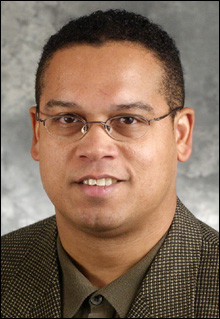
Keith Ellison |
Anyone still wondering whether the GOP has lost touch with the electorate can find more evidence in the controversy over newly elected congressman Keith Ellison, the first Muslim elected to the United States Congress.The storm started when conservatives learned that Ellison plans to use a Koran when taking his purely ceremonial oath of office. The resulting bluster of conservatives, such as radio talk-show host Dennis Prager and former Alabama judge Roy Moore, spurred predictable letters and phone calls to congressmen, one of whom — Republican Virgil Goode of Virginia — rose to the bait. In a letter to constituents, Goode denounced the Koran and Ellison’s constituents, and warned that if Americans did not clamp down on immigration, legal and otherwise, “I fear that in the next century we will have many more Muslims in the United States.”
Never mind that Ellison, a two-term state senator, was born in Detroit, and traces his American lineage to the mid-18th century. Ellison was raised a Catholic, and converted at age 19 while attending Wayne State University. He calls himself a moderate Sunni.
Nor are the voters of Ellison’s district radicals from far-off lands — he was elected to represent Minnesota’s fifth district, a primarily white, suburban piece of the heartland north of Minneapolis.
During the campaign, Ellison faced legitimate questions about his religion and associations — as well as his parking tickets and unpaid income taxes. Voters were apparently satisfied with his answers on all these counts.
Goode’s racist, anti-immigrant attitude is reminiscent of another Virginia Republican, former senator George Allen. In the infamous exchange caught on video during his doomed re-election campaign, Allen assumed that a brown-skinned man, who he called “macaca,” was an immigrant.
It is an interesting coincidence that Virgil Goode is a former Democrat who joined the Republican Party in 2002 — and that Allen lost to a former Republican who defected to the Democrats.
Or perhaps it’s not coincidental at all. Perhaps the parties are realigning, in part, along lines of tolerance.
If so, the GOP’s congressional leaders lend a remarkably tin ear to the public perception that their party is lagging far behind the rest of the country in accepting the diversity of 21st-century America. Their elected officials have grown increasingly white, Christian, and male, while they bash immigrants and gay people, and tear down affirmative action.
Meanwhile, voters nationwide have elected public officials from a wide variety of backgrounds. They are sending two Buddhists, 43 Jews, five Christian Scientists, 15 Mormons, and two Unitarians to serve in the 110th Congress, as well as six people unaffiliated with any organized religion. And Ellison, of course.
That’s why what’s surprising and disconcerting in the “controversy” surrounding Ellison is not the poor behavior of Goode, who is entitled to his opinion, but the response of national Republican Party leaders, who seem either unaware of or indifferent to their public-perception problem.
Rather than simply affirming — even celebrating — the legitimate right of practitioners of any faith to hold public office, national Republican figures have taken a collective pass, from President George W. Bush on down. (South Carolina senator Lindsey Graham is the lone prominent exception as of the Phoenix’s press time.) That, disgracefully, includes Governor Mitt Romney, whose own fitness for office has been questioned on the basis of his Mormon religion.
Good cabinet, curious transition
Deval Patrick’s cabinet seems like an impressive assembly of talent that includes a good mix of insiders and fresh faces. We are eager to see how they perform when the new administration takes over next week.
But we see a lost opportunity for Patrick, who could have used these appointments to publicly define his agenda.
The public and even the media tend to think of the “government” as a monolithic whole, not the sum of many very different parts that perform many very different functions. The naming of each cabinet member could have been a “teachable moment,” an opportunity to suggest or to show how things might be different in a Patrick administration.
But rather than holding press conferences to talk about each office’s new agenda and direction, Patrick announced most of the appointments in bunches, on weekends, with little or no comment. One of the most anticipated appointments in the aftermath of the Big Dig fiasco — head of the Department of Transportation — was made over the Christmas-holiday weekend, while Patrick was overseas in South Africa.
It’s not that we think there are no fresh ideas brewing — quite the opposite. Patrick seems to be rejiggering government functions in some interesting ways, with some cabinet members given control of more than one. Dan O’Connell will run both housing and economic development, for example, and Ian Bowles will oversee both energy and environment.
In addition, Patrick is creating an intriguing “development cabinet,” with the secretaries of labor, transportation, and housing all reporting to Dan Bosley, Patrick’s economic-development advisor.
Given Patrick’s professed desire for inclusion, transparency, and citizen involvement in his government, it would have been great to hear him talk about each of these decisions. Perhaps he will do so in his inauguration speech or soon after. We are all ears.